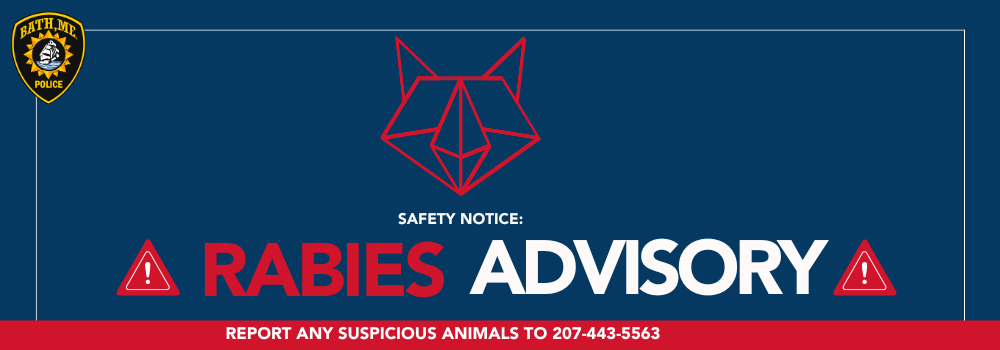Rabies

If you have been attacked by an animal you suspect may be rabid, call 911 right away.
For 24/7 information and advice, call Maine CDC’s disease reporting and consultation line at 1-800-821-5821.
To report an animal acting strangely in Bath, call the Bath Police Department right away at 207-443-5563.
Rabies is spread when an infected animal bites or scratches another animal or person, or when saliva or brain tissue gets into an open cut, or into the mouth, nose, or eyes.
Rabies is not spread by petting a wild animal, by touching dried saliva, or by urine, feces, blood, or skunk spray.
How are Rabies Exposures Treated?
For people, it is a combination of vaccine and rabies immunoglobulin (RIG) shots called “post-exposure prophylaxis”. To work best, the series should begin as soon as possible after being exposed.
An unvaccinated person should get 4 doses of rabies vaccine, one shot at a time, over the course of 2 weeks, along with RIG.
A person who got pre-exposure vaccine should get 2 doses of rabies vaccine – one dose right away and one 3 days later; no RIG is necessary.
A person who has a weakened immune system should receive 5 doses of rabies vaccine over the course of a month.
If the suspected animal is caught and can be tested (if wild) or watched for signs of rabies (if domestic), your doctor should wait to see if treatment is needed for you.
What Should You Do if You Think You Are Exposed to Rabies?
- If you need immediate medical attention call 911
- Clean all wounds with soap and water.
- Contact Bath’s Animal Control Officer (ACO) (207-443-5563, Ext. 3) or Game Warden (1-800-452-4664) if the animal is still on the loose.
- Call your healthcare provider who will determine if you need treatment.
- Contact your veterinarian if you think your pet had rabies exposure.
What is Rabies?
Rabies is a viral disease that affects the brain and spinal cord and is fatal if left untreated. It is very rare in people in the United States. In Maine, it is most common in skunks, raccoons, bats, and foxes.Rabies is spread when an infected animal bites or scratches another animal or person, or when saliva or brain tissue gets into an open cut, or into the mouth, nose, or eyes.
Rabies is not spread by petting a wild animal, by touching dried saliva, or by urine, feces, blood, or skunk spray.
How are Rabies Exposures Treated?
For people, it is a combination of vaccine and rabies immunoglobulin (RIG) shots called “post-exposure prophylaxis”. To work best, the series should begin as soon as possible after being exposed.
An unvaccinated person should get 4 doses of rabies vaccine, one shot at a time, over the course of 2 weeks, along with RIG.
A person who got pre-exposure vaccine should get 2 doses of rabies vaccine – one dose right away and one 3 days later; no RIG is necessary.
A person who has a weakened immune system should receive 5 doses of rabies vaccine over the course of a month.
If the suspected animal is caught and can be tested (if wild) or watched for signs of rabies (if domestic), your doctor should wait to see if treatment is needed for you.
What Can You Do to Prevent Rabies?
- Vaccinate both indoor and outdoor pets and livestock.
- Do not approach, handle, or feed wildlife or unknown domestic animals.
- Do not move wildlife from one area to another, as this can spread rabies.
- Report sick, stray, or strange-acting animals.
- Contact a healthcare provider right away, if bitten or scratched by an animal.
- If you wake up to a bat in the bedroom, safely capture it and call Maine CDC.
- Carry a defense when walking in areas where rabid animals have been reported, such as a stick or pepper spray.
- Seal areas around your home where animals might take up residence or hide, like crawl spaces under sheds.
This content was provided by Maine Center for Disease Control and Prevention (Maine CDC). Additional information can be found here: www.maine.gov/dhhs/rabies
General Information
Monday-Thursday
8:00 AM - 4:00 PM
